International Women's Day
Celebrating International Women's Day: Dickey's, Jack In The Box, Blaze among leaders featured
Female execs, including leaders from Dickey's, Freddy's, Jack in the box and Blaze, talk about how they've handled discrimination and what they want Gen Z to learn from them.
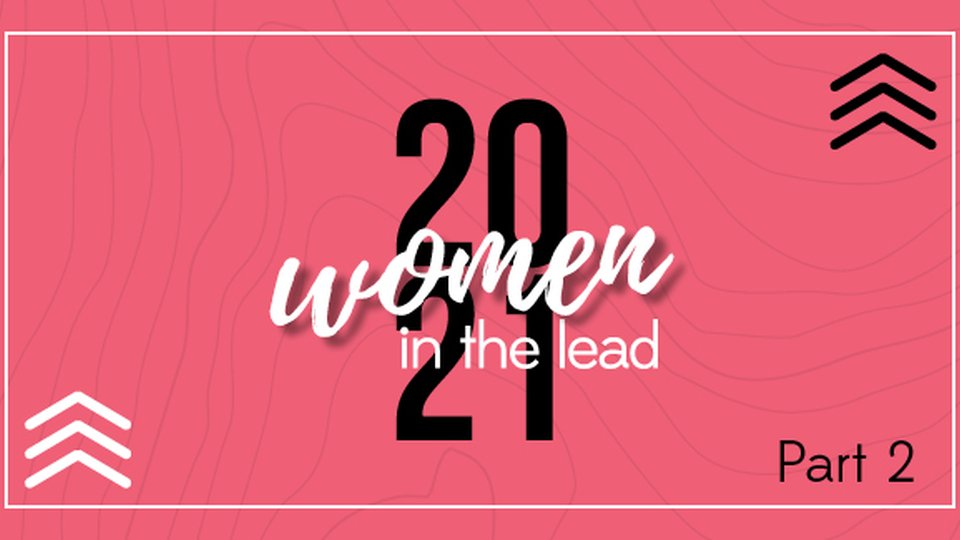
March 9, 2021 by Cherryh Cansler — Editor, FastCasual.com
Editor's note: This is part 2 of a series featuring females executives leading the limited-service industry. Click here for part 1.
Twenty-four hours is simply not enough time to honorInternational Women's Day, which is why FastCasual is still celebrating by featuring advice from 12 more of the industry's leading ladies. They include:
- Marie Zhang, Chief Supply Chain Officer at Blaze Pizza
- Carissa De Santis, CIO, Dickey's Barbecue Restaurants Inc.
- Julie Davis, director of Franchise Development, Freddy's Frozen Custard & Steakburgers
- Virginia Allen, director of Finance, Zaza New Cuban Diner
- Rajina Pradhan, COO and co-founder, Tarka Indian Kitchen
- Marianna Magee, director of Marketing, Chicken Salad Chick
- Stacy Soderstrom, franchise recruiting manager, Jack in the Box
- Loretta Sexton, VP of People Services, Tropical Smoothie Cafe
- Kristyn Clark, director of Brand Communications at Shake Shack
- Amanda Powell, VP of Operations, Coolgreens
- Ally Svenson, cofounder and chief purpose officer, Mod Pizza
- Dawn Ray, SVP Corporate Communications & Public Relations, Focus Brands

Q. How did you get your start in the restaurant business?
A.After I graduated from college with two Master's degrees in Chemistry and Food Science, I led research and development and quality assurance for a Chicago manufacturer that produces meat proteins, including spiral sliced hams for HoneyBaked Ham Company. My efforts and dedication to support the HoneyBaked Ham growth later led me to the amazing opportunity to join HoneyBaked Ham company in Atlanta to oversee their supply chain division for about seven years. After my time at HoneyBaked Ham, I spent three years at YUM Brands as their chief supply chain officer, which eventually steered me to lead the global supply chain for FOCUS Brands for five years. I've been leading supply chain in the restaurant business for 16 years now and am eager to bring my industry expertise to the Blaze team.
Q. Do you believe — as many female leaders have stated — that often women impede the progress of other women's advancement? How do you personally address that in your life?
A.While I'm cognizant that these incidents happen in the industry, I'm lucky to say that I have never experienced this in my career. I have worked with 13 different Presidents and CEOs, two of which were females. My first female boss, Kat Cole, president and COO of FOCUS brands, and my current boss Mandy Shaw, president and CEO of Blaze Pizza, have always supported me and had my best interest at heart. They've been amazing leaders who have been big contributors to my personal growth, and I feel very blessed for this experience.
Q. Can you discuss a time when you were underestimated or discriminated against because of your gender? What did you do? What did you learn from that incident?
A.I'm blessed to say that this is not something I've had to experience throughout my career. I'm a hard worker and deliver great results, which have always been appreciated by my colleagues and upper management.
Q. How do you ensure that your voice is heard and/or that you receive credit and compensation for your contributions?
A.Many times in the workplace, it's challenging for women to have their voice heard and receive credit for their accomplishments. It can be especially tough for women to receive recognition in the form of compensation in comparison to their male colleagues.
The first thing I would say to ensure your voice is heard is to come prepared. When you're getting ready for a meeting, know who is there, what will be discussed, prepare your talking points and questions, and plan for each meeting to the best of your ability. This will help you gain the confidence to speak up during a presentation or conference, which leads me to my second point. Don't be afraid to chime in! If you feel your voice isn't being heard, then use your voice to convey your thoughts or ideas. This can be harder for women, so take a few minutes to put your thoughts together and deliver with confidence. Delivery is key when speaking up. It's important to be confident, however, don't be defensive.
To establish yourself as a valuable asset to the team, build your credit. If you have the opportunity to take the lead on a project, do your best to deliver quality work. Once people know your capabilities, they will trust in your work and appreciate your achievements. Trust in what you know and be open with others, as people respect knowledge and will come to you when needing insight on your expertise. Additionally, let others know your achievements. When there is an opportunity to share your contributions (team meetings, reviews, etc.), share what you have done to make a project or initiative successful. An essential way to ensure you get credit for your accomplishments is to voice your value to the company, and as you establish your credit in the workplace, ask your boss to take ownership of projects where you can excel. Get out of your comfort zone, take ownership of these projects, and deliver the best you can. Taking these steps will help your voice be heard and feel valued for your contributions.
Lastly, it's also important to remember that compensations were cut across many business due to the pandemic, so it can be hard right now for both males and females to feel valued for their work. Be patient and trust in your value, as your hard work will shine through soon!
Q. If you have a daughter (and especially if you have a son) what do you want them to take away from your career position about the value of female leaders?
A.I have two daughters; I constantly encourage them to believe that anything is possible. You can do anything you set your mind to, and it's okay to fail along the way. Have confidence in yourself and what you want to accomplish – that will help reach your full potential.
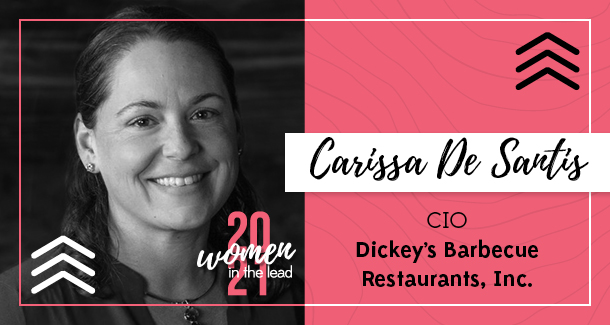
Q. How did you get your start in the restaurant business?
A. I grew up working in the restaurant industry and actually started on the operations side. My father worked for Darden and was part of the team that opened the first Olive Garden, so restaurants are in my blood.
My first foray into franchising was during my time at Fridays when I was opening and training new franchise locations. I actually spent the first half of my career in Operations. It wasn't until I was offered the opportunity to retire from the field and move to IT that I made the switch.
Q. Do you believe — as many female leaders have stated — that often women impede the progress of other women's advancement? How do you personally address that in your life?
A. I practice recognizing those who deserve to be recognized. Regardless of the size of the accomplishment, we need to acknowledge and celebrate fellow women for their contributions. Intentionally recognizing outstanding woman simply offers another opportunity to encourage achievement, provide good examples and widen positive influence.
Q. Can you discuss a time when you were underestimated or discriminated against because of your gender? What did you do? What did you learn from that incident?
A. Being a woman in a male-dominated industry can certainly be a challenge, but coming from a project management background, I understood early on in my career that taking the lead is really how people become influential in business.
Q. How do you ensure that your voice is heard and/or that you receive credit and compensation for your contributions?
A. I'm typically not the loudest voice at the table, but I think accomplishments like these demonstrate that if the work is good, then it speaks for itself. The restaurant space is highly competitive and full of incredible talent, it's important to remember that your output is what you're judged on and if you focus on that then everything else will fall into place.
Q. If you have a daughter (and especially if you have a son) what do you want them to take away from your career position about the value of female leaders?
A. Don't be afraid to try and just go for it. Every great initiative started with an idea. Test things out and if they fail, try again. We are living in a world where almost anything is possible, and it is a very exciting time.
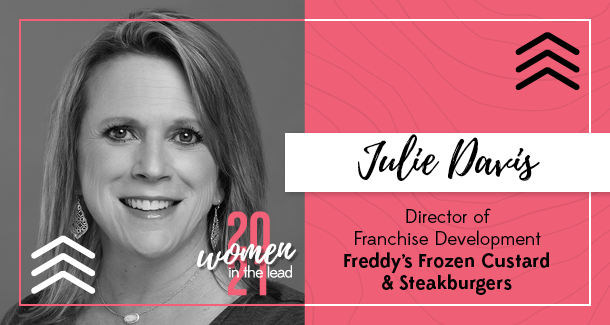
Q. How did you get your start in the restaurant business?
A. It's actually a unique story. I served in the military as a translator for 4 years. Once I left the military I moved to Texas and was looking for a job. Schlotzsky's, which was headquartered in Texas at the time, was looking for a translator, and I applied and got the job. My mentor in that role took the time to show me all there is to know about the franchising industry – especially in the fast casual and QSR sector – and I wanted to get more involved. Over the past 20 years I've had the opportunity to grow and develop national franchise brands like Dairy Queen, El Pollo Loco, Dunkin', and Popeyes, and today I couldn't be more excited to be part of the Freddy's Frozen Custard & Steakburgers team.
Q. Do you believe — as many female leaders have stated — that often women impede the progress of other women's advancement? How do you personally address that in your life?
A. There's no doubt that there's a competitiveness amongst women, but I also believe that it isn't an issue that's exclusive to women. I wouldn't say it happens often, but it does happen. I personally set forward to develop everyone around me, because it's about the team you build and the people you associate with. I look at the way I mentor my team and lead by example the same way I strive to do so for my children. It's just so innate in who I am that I build up people around me. One of the main reasons I was attracted to Freddy's was the fact that so many strong women hold key leadership roles within the company – and they have for years. Since joining this team I've seen first-hand how women leaders can work together and build each other up, all while aiming to move a leading fast casual concept forward.
Q. Can you discuss a time when you were underestimated or discriminated against because of your gender? What did you do? What did you learn from that incident?
A. It was at my first job in franchise development. I was young and quite naïve about intentions of others. I was working with a well qualified franchise candidate group comprised of men. They made unwanted advances and inappropriate comments to me and another female employee involved in their Discovery Day. In the normal course of my role, I would make recommendations on candidate groups for approval. This was otherwise a highly desirable group to join our system. I included the offenses of the group along with my recommendation to not approve them to my largely male executive team. What an experience this was as I was unanimously supported in the decision to not move forward with them as a franchisee. This was an affirmation I was in the right career – one where I could make decisions based on integrity AND be successful.
Q. How do you ensure that your voice is heard and/or that you receive credit and compensation for your contributions?
A. I'm a quiet leader. I like to quietly put in hard work and earn the respect of others around me in the process. I believe that I don't need to have the loudest voice or be the one with the most words; it's about the quality of my work. I'm a hard worker and I strive to make sure that my contributions get recognized rightfully so by delivering results. I'm never prouder than when I get to bestow recognition on my team.
Q. If you have a daughter (and especially if you have a son) what do you want them to take away from your career position about the value of female leaders?
A. Everyone experiences self-doubt as they make their way in school, life, career. Everyone. As cliché as it sounds, you truly can achieve and exceed your goals with hard work and dedication. There are many that trailblazed and fought for equality in race, religion and women's rights that provided us this opportunity to succeed. It is our responsibility to honor them by continuing to build on their progress and set an example for our generations to come. "Pour yourself a cup of ambition…your ship'll come in and the tide's gonna turn…an' it's all gonna roll you away." I'm proud to have experienced the progress we've made as a society since the movie "9 to 5" was released.

Q. How did you get your start in the restaurant business?
A. Prior to joining Zaza New Cuban Diner, I was in public accounting consulting with a variety of restaurant clients ranging from full service to fast casual. It was challenging work, but I found it to be engaging and interesting. I realized quickly, there were opportunities for a person like myself to make a positive impact.
Q. Do you believe — as many female leaders have stated — that often women impede the progress of other women's advancement? How do you personally address that in your life?
A. I have found that women can be tougher on other women because the level of competition to succeed is fierce. We hold each other more accountable, and I welcome this in my professional career because I feel that it drives us towards success.
Q. Can you discuss a time when you were underestimated or discriminated against because of your gender? What did you do? What did you learn from that incident?
A. Throughout the course of my career I've experienced challenges associated with being a woman specifically being paid less than counterparts. My advice, do not settle for double standards, find a way to communicate, document, and track your worth. You cannot always change the mindset of others but hard work and perseverance will always set you apart.
Q. How do you ensure that your voice is heard and/or that you receive credit and compensation for your contributions?
A. By knowing I am just as competent and qualified in my position as anyone else, regardless of gender. Taking charge of my own ideas and not being afraid to speak up when I feel I need to do so. Respect is earned, and that can only be done by voicing a strong opinion with conviction and confidence.
Q. If you have a daughter (and especially if you have a son) what do you want them to take away from your career position about the value of female leaders?
A. Women are becoming stronger leaders within the industry because of our relentless drive and ability to work hard. The dividing line between men and women in business is becoming less and less defined, and the need for women to continue making strides is vital. Eventually in my son's lifetime, the goal would be not to have this conversation anymore, where gender bias and inequality will be a thing of the past.
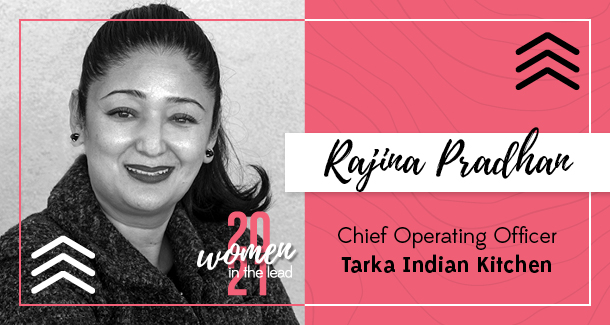
Q. How did you get your start in the restaurant business?
A. My first job in the restaurant industry was at a restaurant in Downtown Seattle. When Tinku and I moved to Austin in 1998, we opened Clay Pit, a full-service Indian restaurant and operated that for 20 years before selling it to the other co-founders. After a short sabbatical, we were itching to get back into the restaurant industry and opened Tarka Indian Kitchen in 2009.
Q. Do you believe — as many female leaders have stated — that often women impede the progress of other women's advancement? How do you personally address that in your life?
A. I've read it. I hear about it. I know it happens, but it hasn't been a part of my experience. This is partly because I've never had a female boss; I am the boss. As women, we're always taught that we need to exhibit male characteristics in order to be successful. You're always trying to look stronger, smarter and be a harder worker. Everyone, including other women, are not teammates, but competitors and people to beat. My outlook and perception is different. I've always had strong, female mentors in my life who had my best interest in mind and encouraged me to not view other women as a threat. As a result, I adopted the same philosophy and became a mentor and champion for other female staff.
Q. Can you discuss a time when you were underestimated or discriminated against because of your gender? What did you do? What did you learn from that incident?
A. We're not giving women enough credit for the leadership roles we play in businesses. In order to change that perception, we, as women, have to be confident enough to believe we provide a valuable role to these organizations. There's always a power struggle. I have always been one of the founders and owners of the restaurants we open. For many years, when I would go into a meeting, I would be viewed and even introduced as "owner's wife," but never the founder. Eventually, I spoke up, corrected them and reminded of the fact that I am an owner too. To be honest, it wasn't until recent years that I would not bring a male counterpart in a meeting with me so I wouldn't be overrun by other attendees. I felt like I needed a man in the room with me to negotiate better pricing and terms. I had to stay persistent, confident, make them understand that I am their client and learned how not to give up – in negotiations or on myself.
Q. How do you ensure that your voice is heard and/or that you receive credit and compensation for your contributions?
A. Everything is a negotiation at the end of the day, trying to make sure that your voice is heard and vocalize your thought process, so that others in the room understand you are just as strategic as them. Even if I have the minority opinion in the meeting, I make a point to provide the reason why I disagree. I try to hear and respect each argument, even when they don't want to hear mine, and then provide strategic, clear and concise thoughts at the end. Even if I don't agree, I will still support what is best for the brand.
Q. If you have a daughter (and especially if you have a son) what do you want them to take away from your career position about the value of female leaders?
A. I have a daughter who is 13 and a son who is 17 and know they are watching me in my leadership positions to form their outlook for the rest of their lives and contribute to their overall perception of female leaders. A few weeks ago, my daughter overheard a conference call I was on where some decisions that were being made. When the call was finished, she said "Thank God you were there to offer that perspective." Fifty percent of the workforce is female, and yet only a small percentage of CEOs are women. Without representation, half of the workforce isn't heard and it's important that my kids understand why female leadership is valuable to all companies, whether they are big or small.
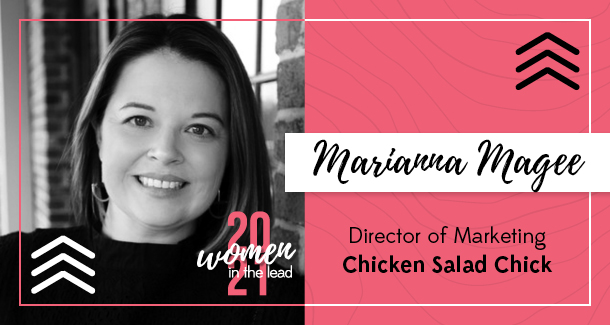
Q. How did you get your start in the restaurant business?
A. I have been involved in the restaurant business since high school. I grew up in Clemson, South Carolina and was a hostess and waitress at a restaurant called Pixie and Bills. It's a Clemson institution! I worked there for multiple years and the experience laid the groundwork for my knowledge and passion for the service industry. In my first corporate job post graduate school, I was the marketing coordinator at Mrs. Winner's Chicken & Biscuits, where I was able to combine my past restaurant experience with my marketing degrees. From there, I have gone on to hold roles in marketing at Arby's, Popeyes, and now Chicken Salad Chick.
Q. Do you believe — as many female leaders have stated — that often women impede the progress of other women's advancement? How do you personally address that in your life?
A. I believe that we can either focus on other's perceptions, or we can forge our own path. I currently lead a team of mostly women who are in the early phase of their careers and are all bright, hard-working and, most importantly, willing to learn. A large part of my role is being a servant leader for them and supporting their needs and development goals. Every day, I focus on creating an environment where the entire team can be supportive of each other. We have progressively built trust by having open communication channels, an ability to share honest opinions, and having fun together! We should all work to stop focusing on the idea of women impeding the progress of other women's advancement, and instead push that perception to the side by concentrating our efforts on being supportive of one another.
Q. Can you discuss a time when you were underestimated or discriminated against because of your gender? What did you do? What did you learn from that incident?
A. In a previous role, I worked closely with an advisory committee of all-male franchisees. I cannot say that I was ever actively discriminated against but, once I was in a role where I had to work with and influence these partners, I knew that I would have to put in some additional effort to gain their respect and their trust. It was a gradual process, and I made the effort to learn about their business, as well as their families. I was transparent in my communication, worked to anticipate their needs and was respectful of their position within the brand. Because of my efforts, I was able to develop strong working relationships with each of the committee members and they will always hold a special place in my heart.
Q. How do you ensure that your voice is heard and/or that you receive credit and compensation for your contributions?
A. I have learned over time that it's important to share your opinion and be assertive when needed. This was something that I struggled with early in my career, but as I gained experience, having the confidence to do this became more natural. Remember that we are all hired because the company that we join believes that we are qualified for the role that we are in. You earned that spot, and it is important to make sure that your voice is heard. It is not how much you say, but rather what you say, that is important. Do not feel intimidated by others in the room that may be more vocal than you are; choose to use your voice. My philosophy is that either you are an order taker, or you have a point of view.
Q. If you have a daughter (and especially if you have a son) what do you want them to take away from your career position about the value of female leaders?
A. I have a niece who is in elementary school and is a student, a writer, an athlete and an actor, to name a few of her favorite activities. She meets life head on and is not afraid to try new things, to be creative, or to use her voice. She has never let obstacles stand her way. I would hope that I, and the many other female influences she has in her life, show her that she can do whatever she puts her mind to. That as she grows up, she can continue to fulfill the philosophy of reaching for her goals and not backing down until she meets them. When I look back on my childhood, I always remember my mom being in a leadership role and not hiding her ambition, and I looked up to her from a career perspective because of this. I hope that I can only do the same for my niece.
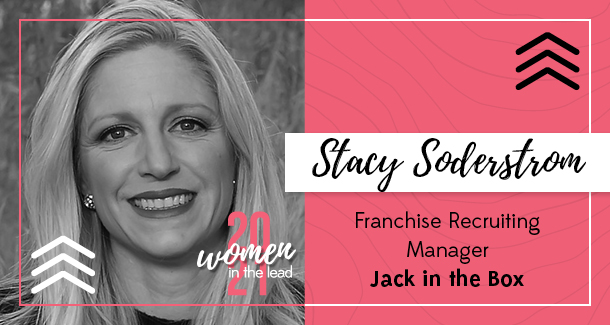
Q. How did you get your start in the restaurant business?
A. Early on in my career, I stumbled into the industry. I was working as a Sales Representative for Xerox right out of college and one day I was visiting a client to check up on their printing needs. I accidently patched through to the wrong floor, which just so happened to be the corporate office of Quiznos Sub. I found out they were hiring for an entry-level sales position, I applied and got the job. I've learned so much about the restaurant and franchising industry and have worked my way up over the past 17 years with roles at leading concepts including KFC, Dog Haus, and now am proud to be part of the Jack in the Box family.
Q. Do you believe — as many female leaders have stated — that often women impede the progress of other women's advancement? How do you personally address that in your life?
A.Unfortunately, yes. I've seen this happen all too often in my career, especially early on. There is a shift happening in our industry, women celebrating other women's career milestones. I have made a conscious decision to align myself with brands that have a culture that embraces diversity and inclusion, and that is one of the many reasons I joined Jack in the Box. Throughout my career I've worked for strong, supportive, amazing women at organizations that encouraged my growth in the field. I personally strive to return the same mentorship I received over the last decade. When I work or engage with younger women just starting out, I look for ways to support their onboarding, and open myself up as a resource to answer any questions they have or provide guidance that will benefit their professional development. I believe strong and successful women want to help others and we are seeing positive results in our field.
Q. Can you discuss a time when you were underestimated or discriminated against because of your gender? What did you do? What did you learn from that incident?
A. I would say there are a few I can recall, one has stuck with me over time. This instance was a prospective franchisee interested in becoming an operator. As I sat down with the candidate, he made it perfectly clear he did not want to work with a woman, despite my qualifications or ability to properly assist. My experiences early on helped me determine the ways to ensure my value in these conversations is heard. Sometimes women are devalued or discriminated against, but I've learned that by having an open conversation about the issue, we can find a mutual way to resolve it. In the past I've seen first-hand how women aren't always taken as seriously as they should, and I've also seen first-hand how the industry has evolved over the past decade in a positive way. While there's still room to grow, there are women currently in leadership roles empowering us to make greater contributions to our organizations and the industry.
Q. How do you ensure that your voice is heard and/or that you receive credit and compensation for your contributions?
A.Personally, when it comes to credit and compensation, I will lean in on my experiences. I focus on being the right fit, highlight my expertise, the contributions I've made at other brands, and why I am the most qualified for the role. When it comes to compensation, I investigate the pay range for the particular role and determine where my experience puts me on the scale. I believe that no matter where a person identifies in their gender male or female, they should be respected equally if able to do the job well and to the same degree.
Q. If you have a daughter (and especially if you have a son) what do you want them to take away from your career position about the value of female leaders?
A. I have a daughter and a son. My biggest takeaway from my career as I raise both of my children, instilling confidence, inclusion, and respect. If they believe they can do something, they should go for it. I want my daughter to see that if she works hard and has determination to succeed, she will. I strive not to let the opinions of others deter me from reaching my goals and it is my hope that she does the same, and that she will always go after what makes her happy. I make it a priority to balance work and family, and through my example I hope she sees that she can be a wonderful mom while also leading a successful career.
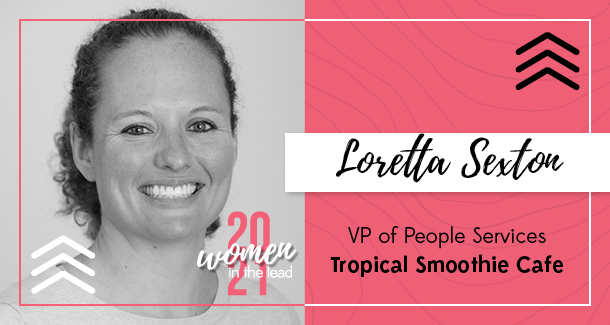
Q. How did you get your start in the restaurant business?
A.I've been in the hospitality world since the very beginning, working in a movie theater at 16, restaurants in college, the grocery industry as a District Manager post-college, and then settling into the restaurant space with Ted's Montana Grill. I began in operations, opening and running several of their units before transitioning to a recruiter. My operational knowledge helped me find and hire the right people. The people and the pace of the restaurant world hooked me early on, and I have never looked back.
Q. Do you believe — as many female leaders have stated — that often women impede the progress of other women's advancement? How do you personally address that in your life?
A. Historically, and in general, the number of females in leadership positions is unimpressive — the restaurant industry is probably even more egregious an offender. The implication is that there's only so much room at the top and we organically limit ourselves and our gender with that assumption. One of my favorite Ruth Bader Ginsburg quotes is about the number of women on the bench. She said, "I'm sometimes asked when will there be enough [women on the Supreme Court], and I say, 'When there are nine,' people are shocked. But there'd been nine men, and nobody's ever raised a question about that."
This is how I feel about the board room and the C-Suite, and I do everything I can to support, encourage, and promote the equity of women. In my role, my job is to remind the group that we need the best leaders, that we need to support and embrace diversity, diversity in race, gender and thought; so until I see a room of all women or all people of color, I will continue to press for and lift up the women in my life.
Q. Can you discuss a time when you were underestimated or discriminated against because of your gender? What did you do? What did you learn from that incident?
A. I grew up in the restaurant business and my role was constantly challenged. I had to prove that I could run the show — all of it — the line, the grill, or even the dish room on a busy night. The kitchen is a tough crowd; you had to let the chauvinistic jokes and sexist comments roll off your back in order to get ahead. I developed a thick skin. There were moments when I would have to get a male counterpart to talk to the team because they simply wouldn't listen to me. I love this world, I do, but when you think about the "Me Too" movement, the restaurant industry was (perhaps still is) a willing participant. The back of the house is a male-dominated environment, which is interesting when you consider women have been consistently told our place is in the kitchen.
The front-of-the-house presented its own irritations. I remember dealing with an angry guest, was an older gentleman, when I was 26. I approached his table to resolve an issue, he looked me up and down, and asked me to "go and get the real manager." I was the most tenured manager in that restaurant and the highest ranking, but it wasn't until I sent out one of my male servers, pretending to be a manager, that the man calmed down. I'd like to say situations like that were rare, but that wasn't the reality.
Being diminutive serves no one. I know I am smart and capable, and I would not be where I am today without this perspective and those traits. I might have to talk a little longer and a little louder, but I no longer leave the room to get help. I understand that the problem isn't me, and I will continue to hold my ground and not allow a person to make me feel inadequate.
Q. How do you ensure that your voice is heard and/or that you receive credit and compensation for your contributions?
A. In my role, I am in a unique position to make sure we are always doing this right. Having been a recruiter, I found it interesting that a majority of men negotiated their wages and maybe 10-15% of women did the same. We aren't taught to be aggressive or to speak up for ourselves; we are taught to be grateful for what we get. I can now combat that by making sure we offer everyone what they are worth and what the role demands — period. Equity is paramount.
As for me, much like the 90% of women who do not negotiate, I have had a hard time speaking up for myself. I have pushed myself out of my comfort zone to make sure I am heard and given credit where it is due. At this point in my career, I am lucky to work for a leader who seeks out my opinion, that is very quick to shine the light on me, and that rewards his people appropriately. My goal is now to help other women get comfortable doing the same.
Q. If you have a daughter (and especially if you have a son) what do you want them to take away from your career position about the value of female leaders?
I don't have children, but I do have plenty of young ones in my life and my goal is to encourage them and help them to be independent, critical thinkers and to believe in themselves. As one of my favorite 18-month old little girls was walking around a room telling people to sit or stand or drink, I laughed at her and told her she was a CEO in the making, so now I call her CEO Chloe.
What I want her and all the other children in my world to learn from me and to learn from my career is to know their worth, to know that their voice is important, and their opinions are valid. Women need to embrace their power and see both women AND men challenging the status quo. Understand that the little girl on the playground is just as competitive, aggressive (this word used intentionally), and hungry for success as any little boy around her; and she can likely throw a ball, run a race, or debate an ornery guest just as well.
The kids in my world need to know it's okay to know what you want and to go after it — just make sure you take the good people with you — male or female — and know that the team is always better when people are encouraged and compensated equally.

Q. How did you get your start in the restaurant business?
A. I started my career in the fashion industry, doing public relations for two well-known designers. After two years of that, I pivoted into the wellness space where I managed PR and brand strategy at SoulCycle. My move to Shake Shack was really driven by my love of the brand and an appreciation for the passionate advocacy they'd cultivated over the years – plus an admiration for the company's leadership. My experience at Shake Shack is my first foray into the hospitality industry. It's been incredibly rewarding to work alongside such talented people over the years and I continue to learn from them every day.
Q. Do you believe — as many female leaders have stated — that often women impede the progress of other women's advancement? How do you personally address that in your life?
A.I haven't personally experienced that in my career. I've been fortunate to work for many amazing female leaders that have always encouraged me, advocated for me and made it a priority to champion my advancement within the organization. It's important to me that I pay that forward with my team as well. I'm intentional about understanding their career goals and doing everything I can to create opportunity for them. I've been lucky enough to always have someone fighting for me – and I want to be that person for my team.
Q. Can you discuss a time when you were underestimated or discriminated against because of your gender? What did you do? What did you learn from that incident?
A.I've certainly had moments in my career where I was talked over in meetings and things of that nature. Those moments serve as a reminder for me to continue to speak up and be a strong voice in any room, and have confidence in my abilities. There are probably still moments that people underestimate me because I'm a woman, but I love to prove them wrong.
Q. How do you ensure that your voice is heard and/or that you receive credit and compensation for your contributions?
A.Confidence is everything. Earlier in my career, I often found myself looking to others for the answers or the right way to do something. Then I realized, there was no "right way". I learned to trust my instincts and stand confident in my abilities. I was just as smart, capable and savvy as anyone else. Once I started believing that, I watched my influence grow. When it comes to compensation, you have to do your research – know the market rate for your role, talk to other people in the industry (male and female) and gauge where your salary falls in comparison.
Talking money can feel taboo, but I've always been one for transparency and will happily share a general salary range with peers in the industry as a benchmark. We have to help each other out! And lastly, maybe most importantly, ask for what you want! I think women are often taught to keep your head down, work hard and then you'll be recognized and rewarded. That can be true, but it's often not. You have to advocate for yourself, explicitly ask for that raise or promotion if you think it's what you deserve.
Q. If you have a daughter (and especially if you have a son) what do you want them to take away from your career position about the value of female leaders?
A.Female leaders often bring an innate ability to understand people, their feelings and perspectives. That's an essential skill to have in order to build and manage successful teams. The most important thing to understand as a leader – whether you're male or female — is that it's not a one size fits all model. Each person on your team will be motivated, discouraged, energized by different things and in different ways. A good leader will take the time to understand each person individually and tailor their management style accordingly.
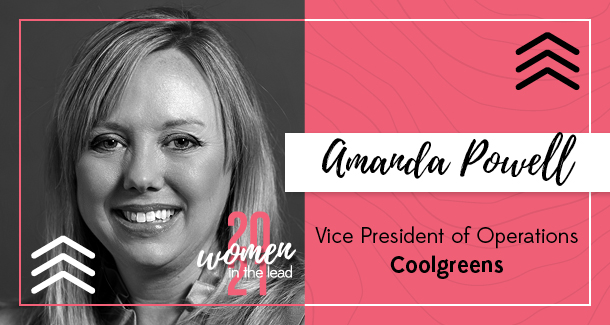
Q. How did you get your start in the restaurant business?
A. My first job was at a local mom and pop restaurant in Washington, Kansas, where I grew up. I fell in love with the people and the restaurant environment and have not looked back.
Q. Do you believe — as many female leaders have stated — that often women impede the progress of other women's advancement? How do you personally address that in your life?
A. There are so many people who haven't worked with great women, and so they are always on the defense, trying to prove themselves and their worth. It's unfortunate that so many of us are driven by their insecurities, and desire to succeed that we push other women down in the process. We are highly emotional creatures and sometimes it limits our ability to see the bigger picture. I actually do the exact opposite. I have many great mentors who helped me become the person I am today, and those individuals inspired me to also be a champion for women leaders.
Q. Can you discuss a time when you were underestimated or discriminated against because of your gender? What did you do? What did you learn from that incident?
A. The only time I have felt underestimated was when I had to work with people in the trades such as repairs for refrigerators, plumbers, electricians, etc. They sometimes don't like talking to women because we are very curious and want to understand the process. I learned to treat them with respect and still ask my questions. but inquire in a way where I can learn and not impede their job. As a result, I had a few that personally would only deal with me after their interaction and would take time to show me how to fix things so I could do myself the next time.
Q. How do you ensure that your voice is heard and/or that you receive credit and compensation for your contributions?
A. I speak up! I also enjoy giving other people credit that helped with any project that we worked on or even they did not work on it.
Q. If you have a daughter (and especially if you have a son) what do you want them to take away from your career position about the value of female leaders?
A. I don't have children, but I teach everyone younger than me, and especially those who are just entering the restaurant industry, to never underestimate a woman. We are strong and fearless in our leadership abilities and will have the best interest of our team and the company. We dare to be great!

Q. How did you get your start in the restaurant business?
Scott (my husband) and I were living and working in London when we launched Seattle Coffee Company in 1994. We opened our first location in Covent Garden, introducing the UK to the Seattle's coffee bar culture. After several months, three new locations and one baby, Scott left his career in finance to join me in the company full-time. Together, we built Seattle Coffee Company to 75 retail locations in under three years, and in 1998 we sold the business to Starbucks — giving the coffee giant its entry into the UK and Europe. While we never intended to enter the world of entrepreneurship, we were driven by our desire to fill a glaring need, which in our case was the double tall lattes that we knew and loved from our hometown of Seattle. Following the sale of Seattle Coffee Company, we went on to help grow Carluccio's, a London-based Italian deli concept, which went public in London in 2005 and was the top AIM listing of the year.
Truth be told, we really had no intention of starting another business, but sometimes a need and opportunity is so clear that you can't ignore it — and MOD was one of those times. Scott and I were raising our four growing boys, and like many busy families, were often shuttling between various activities with a car full of hungry kids. We saw a need for quick, affordable, and healthy and fun dining options, and we became inspired to offer pizza in a new way.
Q. Do you believe – as many female leaders have stated – that often women impede the progress of other women's advancement? How do you personally address that in your life?
A. While I haven't experienced this directly, I'd be naïve if I said it didn't exist. But I do find it totally unfortunate and certainly, for women, a massively missed opportunity! When women collaborate, support, and build each up, extraordinary things can happen and inevitably everyone can benefit. I believe this so strong and have always agreed with Madeleine Albright's statement that "there is a special place in hell for women who don't help other women."
I'm so lucky to have been exposed to so many amazing female role models who have impacted my career and life on many levels. I now work hard to try and provide inspiration and support to all of the women in my life – at MOD and beyond.
Not long ago, I heard Melinda Gates speak to a group of middle school girls. Although she sits on a huge world stage, helping to solve some of our biggest problems, I was so inspired to see her take time to connect with this small group of local girls. It was a great reminder that often times it's the small moments that can end up providing the seed for larger impacts.
Q. How do you ensure that your voice is heard and/or that you receive credit and compensation for your contributions?
A. Scott and I have the Harry S. Truman quote hanging in our office, "It is amazing what you can accomplish if you do not care who gets the credit." We've tried to practice this wisdom while building MOD.
MOD exists to serve people, starting with our employees (the MOD Squad) and then our customers and communities. As a servant-leader, I believe that I exist to be of service to the MOD Squad. We've learned that when we are truly in service to our employees, they are inspired to serve our customers, and MOD will continue to grow and thrive.
We have always measured MOD's success not by the number of stores we open, but by the number of people we can positively impact. My job is to keep this front of mind, and to continue to do what I can to engage and inspire as many people as possible.
Q. If you have a daughter (and especially if you have a son) what do you want them to take away from your career position about the value of female leaders?
A. Scott and I have four sons and it's been really valuable for them to see that we're equal partners in the business and in life. I'm grateful to say that I believe our boys fully appreciate and expect that women are meaningful and powerful contributors to the world, worthy of great respect.

Q. How did you get your start in the restaurant business?
A. Focus Brands is my first stint in the restaurant business, but I have spent the bulk of my career working with franchisees in the hospitality segment, primarily with hotels and at Hilton.
Q. Do you believe — as many female leaders have stated — that often women impede the progress of other women's advancement? How do you personally address that in your life?
A. I don't really think women impede the progress of other women any more than men might impede women's progress in an organization. I think a lot of times our circumstances, colleagues and past experiences, and if we have seized the opportunities set before us, play a huge role in how and when you advance. I also think the mentors and colleagues you surround yourself with play a larger role in your growth, development and career path than you realize.
I have been very blessed in my career to have both male and female mentors, role models and coaches to help me figure out the best career path, how to advance my career and how to improve upon certain areas or projects not only to do my job better but to beef up my resume to show a path forward. I've been able to seize a lot of opportunities (some of which have been true learning opportunities) that have been brought forth through exposure to great leaders, as well as leaders who, quite simply, weren't ideal leaders. Truthfully, I've had bosses who were not ready to be leaders or who shouldn't be leading a particular area or department, and I've honestly learned as much from them as I did my favorite bosses. Sometimes it's about learning what NOT to do when you become a leader.
My parents always taught me that you are responsible for a great portion of your fate just by sheer tenacity, determination, education and good old fashioned hard work. They also taught me there is a lesson to be learned — good or bad — in every situation. So, if you are doing all of those things – working hard, looking for learning opportunities in every situation and surrounding yourself with great mentors, you can be one of the primary drivers for your own career path.
In my personal and professional life, if I feel ANYONE is impeding my progress or path forward, whether on a project or in my career, I will ask questions to try and get to the bottom of it. Additionally, I try to always assume positive intent, and honestly that's one of the hardest things to do, especially when you feel someone is impeding your progress. I ask a lot of questions, not for control or lack of trust, but I seek to understand. I treat a lot of situations like a journalist would: I ask probing questions, to get to the WHY and a lot of times, you can discover someone's intentions weren't what you thought they were at all.
Q. Can you discuss a time when you were underestimated or discriminated against because of your gender? What did you do? What did you learn from that incident?
A. I have spent my entire career working in mostly male-dominated industries: hospitality and hotels, hotel development, commercial real estate, healthcare; and there have been a few times when I was underestimated simply due to the fact that I am a woman. However, I am proud to say those times have been a lot less than other female colleagues have seemed to experience.
I have always worked to find the right balance of being true to myself as a leader and a woman, while also knowing my audience. I've always loved sports and have been a follower of sports for a long time. I even entertained the idea of being a sports journalist in college and have a Sports Management Minor. I do find that my love of sports and ability to "talk sports" in some form or fashion with a group of men has made my path somewhat easier. I'm also a mom of two boys who play a lot of sports, so I'm honestly consumed with "sports and boy things" outside of my work life.
Q. How do you ensure that your voice is heard and/or that you receive credit and compensation for your contributions?
A. You may not always have a seat at the table, but you have a voice and you should use it. Sometimes that means managing "up" to have your voice heard. Sometimes, it means not using your voice and being silent to really listen to others and their points of view. Everyone has a voice and should use it to set the tone. You are responsible for that voice and how you show up to a meeting or situation or how you handle a project. And that voice — by doing — speaks volumes. Again, ultimately who you surround yourself with in terms of mentors and coaches can truly help you ensure your voice is heard.
Q. If you have a daughter (and especially if you have a son) what do you want them to take away from your career position about the value of female leaders?
A. My husband and I have been married for 20 years. and we are raising two sons (15 and 10). We have always viewed parenting (and our marriage) as a team effort. The last 12 months have been extremely challenging and working parents — moms and dads alike — have certainly suffered. Our homes have become our offices, our kids' classrooms, our gyms, our neighborhood restaurants and bars, our refuge, our play space and so much more than just a place to sleep.
The pandemic has taken its toll on everyone and my family was no different. At nearly the same time I joined Focus Brands, my job was eliminated due to COVID. My husband's job was also eliminated on the same day! Of course, I was extremely fortunate to take on this newly created role at Focus Brands and we made the conscious decision, together that my husband would stay home and not return to work for the time being. We decided that ultimately it made the most sense for our family so that when our kids went back to school, or had to tackle virtual learning, or if we were faced with one of us or a family member coming down with COVID, it would be better if one of us wasn't working. In this instance, he took on this role and is thriving with this new responsibility.
It is important to us as parents (especially as parents of sons) that we are raising our boys to not only be decent and caring humans, but men who understand the value of partnership in marriage and relationships and that women are valuable leaders. Sure, it's important for them to see an example of a mom who works tirelessly to provide for her family financially, taking on a newly created role at a company and leading a team. But more importantly to me, as a mom of sons, they have an example of a man, a husband and father, taking an active role in parenting and being so many things to all of us: Chief Household Officer, Mr. Mom, Kid's Uber driver, calendar organizer, scheduler, chef, Mr. Fix-it, tech support, tutor, coach, fitness instructor and more than I could possibly imagine. I would argue he is busier now than he has ever been, and possibly happier than he has ever been. And our family is all the better for it.
 ChatGPT
ChatGPT Grok
Grok Perplexity
Perplexity Claude
Claude














